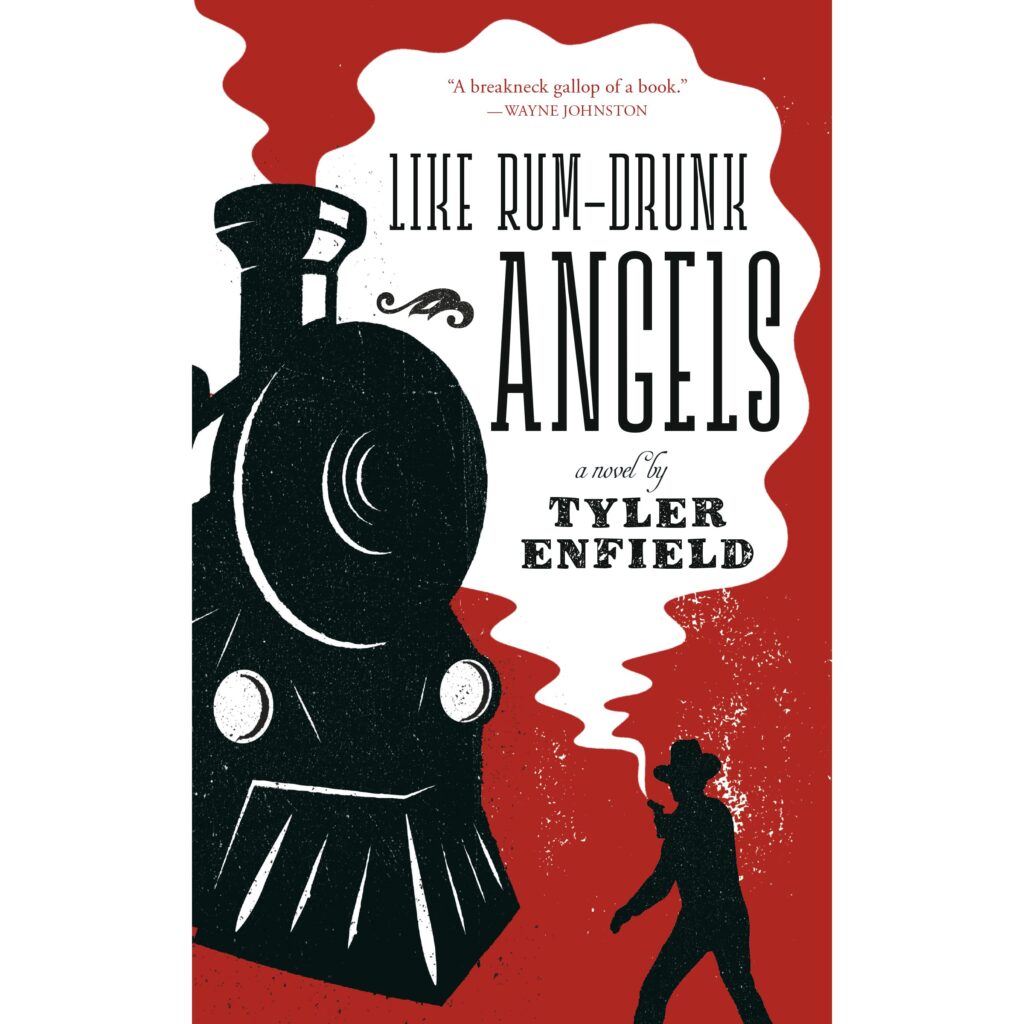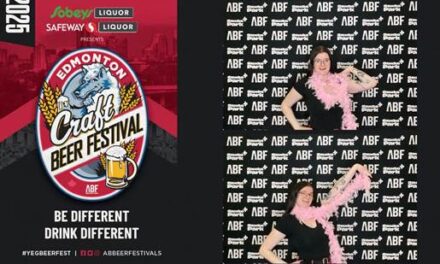No story is finished, no world is completed, no characters are worth remembering…

Review by Kyle Levesque
“Robert feels a quickening in his blood. As though something new has been put there, and something else has been taken away. As though all the mothers of the world will keep calling and calling. And all the little boys will keep turning, turning. Their eyes already fixed on the places they’ll go.”
Those may be the closing lines of Like Rum-Drunk Angels, but by the time the book is complete, no story is finished, no world is completed, no characters are worth remembering. The only thing I was left with was a painful review process.
This book is bad.
Tyler Enfield is from Edmonton, Alberta, and this is his third novel. To his credit, he’s managed to garner sizable acclaim. His previous book, Madder Carmine, won the 2016 High Plains Book Award, and Like Rum-Drunk Angels was positively reviewed by The Globe and Mail, The Edmonton Journal, and CBC. Perhaps most notably, it won the 2021 Robert Kroetsch City of Edmonton Book Prize. All of this is no small achievement for any writer. I was drawn to this work, as it seemed a successful example of local literature. The plot also drew me in. It seemed fun.

Like Rum-Drunk Angels is a magical realism story. It’s something of a loose mix between Gabriel Garica Marquez and Sergio Leone. It follows Francis Blackstone, a fourteen-year old boy living in the town of Nowhere, Arizona. One day, after falling madly in love with the daughter of the town Governor, Francis heads off into the world to make his fortune. He meets up with the famed bandit Bob Temple, and along with Bob’s brother Sam and their friend Ned, they head west to California, to rob a Manhattan Company Bank.
Along the way, the group forms a rivalry with a band of criminals known as the Carter Gang. They rob trains, gather vast sums of wealth, and become internationally famous. However, once they eventually reach the Manhattan Company Bank, they find the vault has been cleaned out by the bank itself.
This failure causes Bob Temple to snap, and, blaming Francis, runs back to Nowhere to kidnap the Governor’s daughter. In his chase back east, Francis loses some of his companions, then finds another, then loses them, too. He survives gunfights, pedophillic muggers, and flying pianos, finally saving his love from the clutches of Bob Temple. The book ends with a massive jump forward in time, with Francis reminiscing on his past, now as a grandfather.
If you noticed things got a bit confused in that third paragraph, you’re not alone.
Like Rum-Drunk Angels’ least grievous failure is that it flounders at the attempt to innovate, change, or otherwise make use of classic storytelling tropes. The reviews that line the covers of this book claim it as an, “inventive re-imagining of many classic tropes.” I see the tropes, but no re-imagining.
Recurring characters include the three Amish sisters, who are written as allusions to Macbeth’s Witches, or mythology’s Fates. Yet they do nothing new. They play no role in the story. Everything they prophesy to Francis, he was going to do anyway. They talk, but there’s no reason to listen. They feel as though they’re merely here because… well, because.
The midpoint of the book is Francis and his gang robbing the Manhattan Company Bank. They waltz into the building to find the vault empty. To use a contemporary example, it’s a moment deeply reminiscent of Kung-Fu Panda’s Dragon Scroll. But the difference between Kung Fu Panda and Like Rum-Drunk Angels, is that the former gets the point of the hero’s reflection. Of the seemingly empty prize. This moment means nothing to Francis Blackstone – indeed, in a pattern that comes up time and time again, he forgets about it within a page. It doesn’t change him and he’s not shown anything he needs to see. It feels like this moment is included because… well, other stories do this too. The moment brings a fairly rapid shift in some of the other characters, like Bob Temple, but that’s it. I find it hard, from a narrative point of view, to see the point of a midpoint twist that doesn’t even register with the main character.
Less structurally constricting is Like Rum-Drunk Angels’ insistence on philosophizing to the reader. Here’s the thing: I love philosophy. I think the practice, the study, and the reading of philosophy to be a wonderful thing. It’s something I spend time on, and I love when a book forces me to challenge the way I see the world. Yet with that being said, I don’t find arm-chair musing, rambling, and meandering very much fun to read. Especially when it never comes to any meaningful point.
Most of the philosophy in this book comes at the end of the chapters’ sub-sections, often in the form of visions, dreams, confessions, or whatever. Sometimes it even comes in the form of the author speaking directly to the reader. But the problem is that it never changes. The philosophy never goes anywhere. There are no arguments, just observations.
Everything remains the same, just written in a different way, and given how much time is spent on it, the philosophizing brings nothing to the story. If you’ve read the preface to any book by Camus or Sartre, you’ve gotten a much deeper engagement with existentialism than this book can offer.
On a structural level, I am lost to find any conclusion to any story-line. Not once, with any character in this book, major or minor, do we get a satisfying or meaningful conclusion to their narrative. Nothing in this book pays off. Every relationship, every struggle, every conflict, feels as though it’s forgotten immediately after it’s been introduced. Characters die with no impact, and they’re introduced with no impact. Story events appear, then disappear. Nothing feels like it has any consequence – not the characters, the world, or the themes.
At a narrative level, the heart of this book’s problems is Francis Blackstone, the main character. Simply put, he is a poor main character. Nothing about him feels human. This boy is totally alien. His reaction to every event of the plot – the murder of his brother, his friend, and his adopted daughter, international fame, boundless love, the deepest hate, his mentor’s seismic betrayal, Faustian deals with ghosts, pedophilia (we’ll come back to this), God, the entirety of biological existence – is just “Oh, okay.” That’s it.
Francis reacts to nothing. He doesn’t think about anything. He has no real struggles. Contrasted with the endless philosophical rambling, the most meaningful conflict in his life is Francis’s desire not to engage with the story. His most defining character trait is that he doesn’t think. He just does things, and everyone else thinks for him.
Which could be okay, interesting even, if the other characters of this story cared, if they critiqued him. Perhaps if this impulsivity stood as Francis’s flaw. But the problem is, everyone loves Francis. Some of the characters are even convinced he’s some kind of secular American Prophet. Even worse, there are never any stakes. This character, before the set-up has even finished, is out-adventuring Odysseus. There’s never any struggle. Nothing matters to this boy, and for that reason, I found him entirely alienating. It’s impossible to get into a story where the main character doesn’t feel anything.
Yet all of this is forgivable. While it makes for a poor novel, it’s not what makes Like Rum-Drunk Angels as bad as it is. It’s the next problem.
The single greatest failing of this novel is in its handling of Lilly.
Francis, on his journey home, rescues, and subsequently adopts, a young orphan girl. This girl, Lilly, pregnant with what is implied to be her father’s child, is later murdered by the Carter Gang. Lilly and Francis spend a sizable amount of time together, working out to roughly one fifth of the story’s length. Yet, for all this trauma and all this time in the narrative, following her death Lilly is mentioned only thrice more in the book: in a minor way in the following two subsections, then finally at the very end, as a footnote to Francis’s story. Francis never changes as a result of this relationship, nor does the world of the story.
Not once is this young girl’s burial mentioned, and Francis never shows any desire to make right the horrors his adopted daughter suffered. Indeed, within only a few days of narrative time, Francis has entirely forgotten about Lilly, and by the end of the novel, he’s cut a deal with the girl’s murderers. Francis is inhuman, but the way that this book handles Lilly reflects more deeply on the novel than just a poor main character.
For the fun, magical read this book is touted to be, the entire character of Lilly is deeply shattering. Her story is a truly horrific one. I like books to challenge me, to make me think, to dig into things I don’t always want to deal with, but they need to handle these incursions with grace and respect. Lilly could have been a way to humanize Francis, to bring some real stakes and meaning into the story.
But not only was Like Rum-Drunk Angels’ handling of Lilly poor storytelling, it was downright callous. Francis says he cares about her, but does nothing to back those statements up. In truth, he acts in a way completely counter to them. He couldn’t care less about Lilly, and at times, it feels like the book couldn’t either. I can’t tell if her trauma is just used for a cheap shock, or if Enfield didn’t see what kind of a picture he was painting.
Through its callousness, Like Rum-Drunk Angels fails to do justice by that which it mines for shock value. The horror Lilly suffers is played for little other than an emotional equivalent to the sensational cowboy-fun portrayed elsewhere in the novel: violence and trauma merely for the sake of it. It is made into a spectacle, forced to dance for the convenience of the author. This is emotional voyeurism, and in its refusal to condemn, Like Rum-Drunk Angels accepts.
I don’t feel entitled to give anyone advice on anything, but I’ll say this: don’t bring up themes like this unless you’re able to do them justice. If you cannot handle the emotional intensity of what you’re writing, don’t write it.
For everything, there are moments of good writing here. Nearly every section of this book begins with some terrific imagery. But it’s too little, too late.
If you’re looking for a good read, I cannot recommend this book. Tyler Enfield is from Edmonton, and for that reason, I want to support his work. But in good conscience, in trying to support artists actually innovating and telling stories that need to be told, and telling them with respect and care, I refuse to give this novel any more acclaim than has been thrown its way.
Like Rum-Drunk Angels is a bad book.
Like Rum-Drunk Angels is published by Goose Lane


